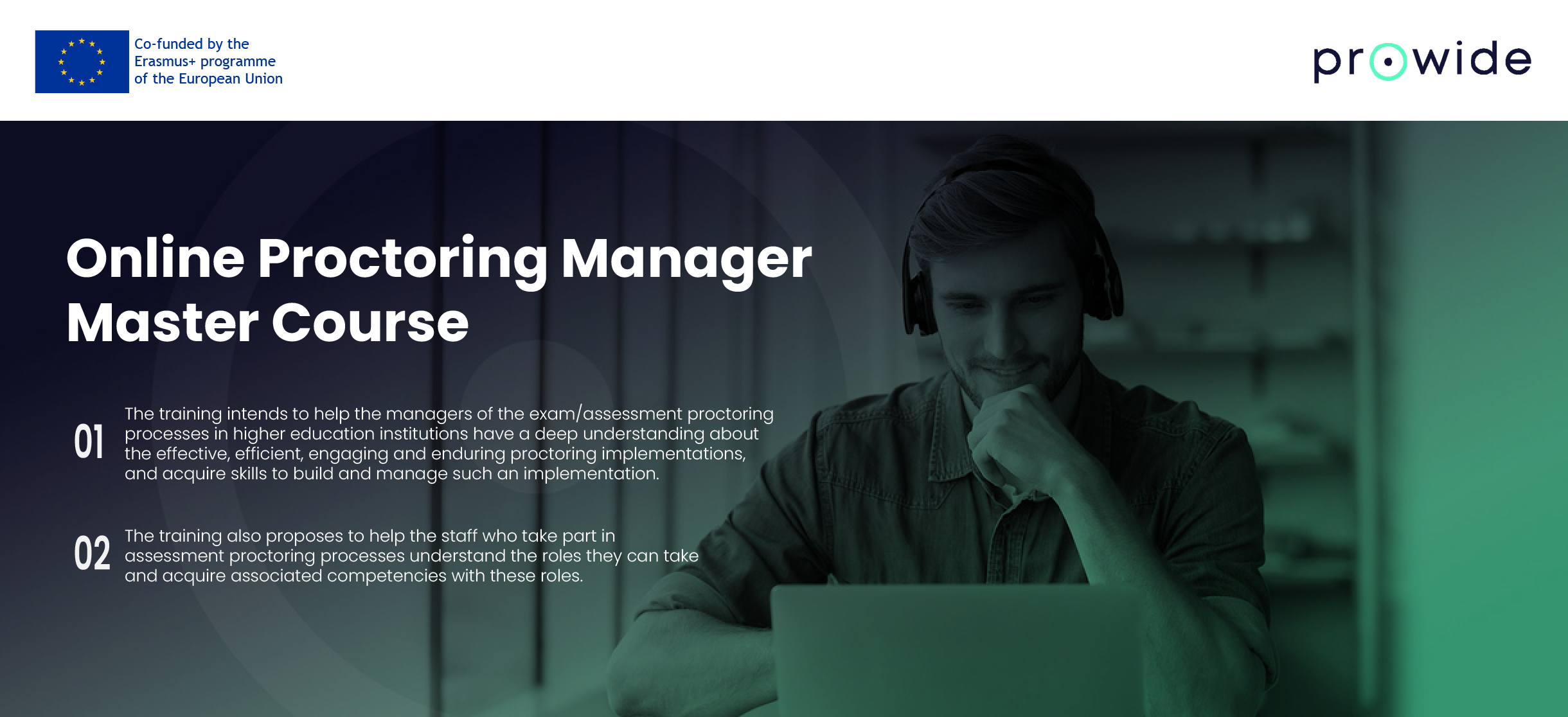Konu özeti
-
-
Görüntüle
Hi and welcome to the Online Proctoring Manager course!
The goal of this course has two folds:
- It intends to help the managers of the exam/assessment proctoring processes in higher education institutions have a deep understanding about the effective, efficient, engaging and enduring proctoring implementations, and acquire skills to build and manage such an implementation.
- The training also proposes to help the staff who take part in assessment proctoring processes understand the roles they can take and acquire associated competencies with these roles.
This is a self-paced course. For this reason, please have a look at the course syllabus before you begin.
-
Forum
-
KaynakGörüntüle
The syllabus provides an overview of the Online Proctoring Manager course and gives you many helpful hints for completing this Moodle course. We recommend that you read this help text carefully before starting.
-
Görüntüle Not kazanma
-
-
-
Görüntüle
-
Görüntüle
-
-
Görüntüle Not kazanma
-
Görüntüle
-
Görüntüle
-
Görüntüle
-
Görüntüle
-
-
Görüntüle Not kazanma
-
Görüntüle
-
Görüntüle
-
Görüntüle
-
Görüntüle Not kazanma
-
Görüntüle Not kazanma
-
-
-
Görüntüle
-
Görüntüle
-
Görüntüle
-
Görüntüle Not kazanma
-
Görüntüle
-
Görüntüle
-
Görüntüle Not kazanma
-
Görüntüle
-
Görüntüle
-
Görüntüle
-
Görüntüle Not kazanma
-
Görüntüle Not kazanma
-
-
-
Görüntüle
-
Görüntüle
-
Görüntüle
-
Görüntüle
-
Görüntüle Not kazanma
-
Görüntüle
-
Görüntüle
-
Görüntüle
-
Görüntüle Not kazanma
-
Görüntüle
-
Görüntüle
-
Görüntüle
-
Görüntüle Not kazanma
-
Görüntüle
-
Görüntüle
-
Görüntüle
-
Görüntüle
-
Görüntüle
-
Görüntüle
Practical activity:
In this part of the learning unit, you will perform a practical exercise based on the knowledge you have acquired.
You will be given the opportunity to design your own exam in a provided Learning Management System (LMS), prepare the online proctoring settings, and administer it with a small cohort of test-takers. You will then be able to evaluate the results from this test and use the various analysis tools in the evaluation report, the so-called “Gradebook”.
In order to get access to your individual LMS environment please contact: sales@proctorio.de.
In case you already have an LMS please let us know its name, under which URL it is available and where you wish to store your data.
-
Görüntüle Not kazanma
-
Görüntüle Not kazanma
-
-
-
Görüntüle
-
Görüntüle
-
Görüntüle
-
Görüntüle
-
Görüntüle Not kazanma
-
Görüntüle
-
Görüntüle
-
Görüntüle
-
Görüntüle
-
Görüntüle
-
Görüntüle
-
Görüntüle
-
Görüntüle Not kazanma
-
Görüntüle
-
Görüntüle Not kazanma
-
Görüntüle Not kazanma
-
-
-
Görüntüle
-
Görüntüle
-
SCORM paketiEtkinliği tamamla Not kazanma
-
SayfaGörüntüle
-
Görüntüle
-
Görüntüle
-
Görüntüle
-
Görüntüle Not kazanma
-
Görüntüle
-
SCORM paketiGörüntüle Etkinliği tamamla
-
SayfaGörüntüle
-
Görüntüle
-
Görüntüle
-
Görüntüle Not kazanma
-
Görüntüle Not kazanma
-
-
-
Görüntüle
-
Görüntüle
-
SCORM paketiGörüntüle Etkinliği tamamla
-
Görüntüle
-
Görüntüle
-
Görüntüle Not kazanma
-
Görüntüle
-
SCORM paketiGörüntüle Etkinliği tamamla
-
Görüntüle Not kazanmaAçıldı: Perşembe, 27 Nisan 2023, 5:04 ÖS
-
Görüntüle
-
Görüntüle Not kazanma
-
-
-
Görüntüle
-
Görüntüle
-
SCORM paketiGörüntüle Etkinliği tamamla
-
Görüntüle
-
Görüntüle
-
Görüntüle Not kazanma
-
-
-
Görüntüle
-
KaynakGörüntüle
-
Görüntüle
-
SCORM paketiGörüntüle Etkinliği tamamla
-
Görüntüle
-
Görüntüle Not kazanma
-
Görüntüle
-
SCORM paketiGörüntüle Etkinliği tamamla
-
Görüntüle
-
Görüntüle Not kazanma
-
Görüntüle
-
SCORM paketiGörüntüle Etkinliği tamamla
-
Görüntüle
-
Görüntüle Not kazanma
-
Görüntüle
-
SCORM paketiGörüntüle Etkinliği tamamla
-
Görüntüle
-
Görüntüle Not kazanma
-
Görüntüle
-
SCORM paketiGörüntüle Etkinliği tamamla
-
Görüntüle
-
Görüntüle Not kazanma
-
Görüntüle
-
SCORM paketiGörüntüle Etkinliği tamamla
-
KaynakGörüntüle
-
SınavGörüntüle Not kazanma
-
Görüntüle
-
SCORM paketiGörüntüle Etkinliği tamamla
-
Görüntüle
-
Görüntüle Not kazanma
-
Görüntüle
-
SCORM paketiGörüntüle Etkinliği tamamla
-
Görüntüle
-
Görüntüle Not kazanma
-
KaynakGörüntüle
-
Görüntüle
-
Görüntüle Not kazanma
-
-
Dear ParticipantsThis section of the course covers the last compulsory activity of the training. In order to receive a digital badge you must complete it.The exam helps you and us the extend you have acquired the competencies the training focused on. It covers all the modules.
So, please complete the following exam (proctored).-
Görüntüle Not kazanma
-
